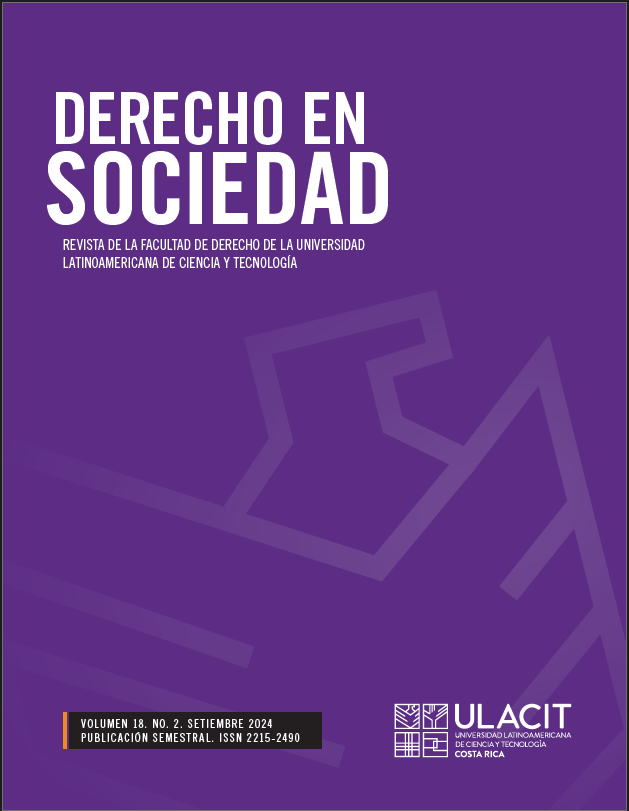Private Funding at High-Level Elections: the Costa Rican Case for Explaining Vote Increase

Published 2024-09-24
Keywords
- Private funding,
- electoral outcomes,
- political finance,
- Costa Rica,
- mixed electoral system
- public funding,
- national elections,
- donor influence,
- political parties,
- lectoral finance in Latin America ...More
How to Cite
Copyright (c) 2024 Derecho en Sociedad

This work is licensed under a Creative Commons Attribution-NonCommercial-ShareAlike 4.0 International License.
Downloads
Altmetrics
Abstract
This paper examines the role of private and public funding in shaping electoral outcomes in Costa Rica, focusing on the period from 2010 to 2020. Drawing on data from multiple election cycles, the study investigates how financial contributions influence the success of political parties in a mixed funding system where both state and private funds play significant roles. The analysis reveals that private funding strongly predicts electoral performance, particularly in national-level elections, where it significantly correlates with the number of votes received. The number of individual donors also emerges as an essential factor, reflecting broader public support and contributing to electoral success. Additionally, the study finds that parties competing at the national level benefit from greater visibility and the ability to accumulate votes across different elections, further enhancing their electoral prospects. The interaction between public and private funding highlights the complexity of Costa Rica’s electoral finance system, suggesting that parties that effectively leverage both funding sources are more likely to succeed. These findings have important implications for understanding the dynamics of political finance in emerging democracies and underscore the need for continued efforts to ensure transparency and fairness in electoral processes. The paper concludes by discussing the broader implications of these results for electoral systems in Latin America and suggesting areas for future research.
References
- Ansolabehere, S., De Figueiredo, J. M., & Snyder Jr, J. M. (2003). Why is there so little Money in US politics? Journal of Economic Perspectives, 17(1), 105-130.
- Barutt, B., & Schofield, N. (2016). Measuring Campaign Spending Effects in Post- Citizens United Congressional Elections. In The Political Economy of Social Choices (pp. 205-232). Springer, Cham.
- Bailey, M. (2004). The Two Sides of Money in Politics: A Synthesis and Framework. Election Law Journal, 3(4), 653-669.
- Burnell, P. J., & Ware, A. (Eds.). (2006). Funding democratisation. Transaction Publishers.
- Castro Vega, O. (1996). Fin de la Segunda Republica, Figueres y la Constituyente del 49. San José: Litografía e Imprenta LIL, SA.
- Carey, J. (1997). Strong candidates for a limited office: Presidentialism and political parties in Costa Rica. Presidentialism and democracy in Latin America, pp. 199–224.
- Crowder-Meyer, M., & Cooperman, R. (2018). Cannot buy them love: How to party culture Among donors contributes to the party gap in women’s representation. The Journal of Politics, 80(4), 1211-1224.
- Dawood, Y. (2015). Campaign finance and American democracy. Annual Review of Political Science, 18, 329-348.
- Gerber, A. S. (2004). Does campaign spending work? Field experiments provide evidence and suggest new theories. American Behavioral Scientist, 47(5), 541-574.
- González, L. A. S. (2009). La financiación de los partidos políticos en Costa Rica. Revista de Derecho Electoral, (8), 2.
- Levitt, S. D. (1994). Using repeat challengers to estimate the effect of campaign spending on election outcomes in the US House. Journal of Political Economy, 102(4), 777-798.
- Mendilow, J., & Phélippeau, E. (Eds.). (2018). Handbook of political party funding. Edward Elgar Publishing.
- Sánchez, F. (F. F. S. C. (2004). Dealignment in Costa Rica [PhD thesis]. University of Oxford.
- Smith, T. (2001). Race and Money in Politics. North Carolina Law Review, 79(5), 1469-1522.
- Tham, J. C. (2017). Of aliens, money, and politics: Should foreign political donations be banned? King’s Law Journal, 28(2), 262-278.
- Van Biezen, I. (2003). Financing political parties and election campaigns: guidelines. Council of Europe.
- Whiteley, P. F. (2011). Is the party over? The decline of party activism and membership across the democratic world. Party Politics, 17(1), 21-44.

